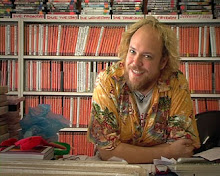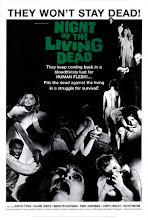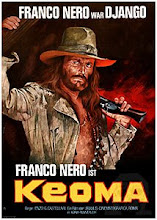 The Rebel Rousers
The Rebel Rousers
Director Martin B. Cohen Writers Martin B. Cohen, Michael Kars
Cast Cameron Mitchell (Paul Collier), Bruce Dern (J.J. Weston), Diane Ladd (Karen), Jack Nicholson (Bunny), Harry [Dean] Stanton (
Welcome to our Counterculture special on Schlock Treatment – hippies, bikers, and surly Mexicans all vie for screen time in a three hour non-stop sticking it to the Man-a-thon.
 The Rebel Rousers is a prime example of biker nastiness from 1967. There were biker films before – The Wild One with Marlon Brando, Russ Meyer’s Motorpsycho – but Roger Corman’s The Wild Angels from 1966 cemented the genre, and for the next five or six years there were scores of them, while square audiences got their kicks vicariously. Usually told from the biker’s point of view, it’s about frontier freedom, with all the inbuilt philosophical flaws and inconsistencies, and the genre found its zenith in Easy Rider – Peter Fonda and Dennis Hopper representing the Death of the American Dream, and Jack Nicholson as a booze-soaked lawyer providing the running commentary.
The Rebel Rousers is a prime example of biker nastiness from 1967. There were biker films before – The Wild One with Marlon Brando, Russ Meyer’s Motorpsycho – but Roger Corman’s The Wild Angels from 1966 cemented the genre, and for the next five or six years there were scores of them, while square audiences got their kicks vicariously. Usually told from the biker’s point of view, it’s about frontier freedom, with all the inbuilt philosophical flaws and inconsistencies, and the genre found its zenith in Easy Rider – Peter Fonda and Dennis Hopper representing the Death of the American Dream, and Jack Nicholson as a booze-soaked lawyer providing the running commentary.
 The Rebel Rousers is a different breed, told mostly from the point of view of Paul Collier (Cameron Mitchell), a Joe Sixpack architect who chases his pregnant girlfriend to a sleepy coastal town, and runs into former football team member JJ (Bruce Dern), now gone to seed and cracking skulls with his biker gang the Rebel Rousers. JJ says it’s all about doing his own thing, being “where it’s at” and other well-meaning hippie aphorisms, but the other gang members including the stripy-panted Bunny (Jack Nicholson) are after much darker kicks, and drag Paul and his girlfriend Karen (Diane Ladd) from their stalled car for a round of Beach Blanket Bingo. After almost constant bickering, like petulant children with ADHD, JJ agrees to a bike race along the beach to see who scores the pregnant Diane Ladd for the night. Sure, he’s a biker with a conscience, but pragmatism rules their bizarre universe.
The Rebel Rousers is a different breed, told mostly from the point of view of Paul Collier (Cameron Mitchell), a Joe Sixpack architect who chases his pregnant girlfriend to a sleepy coastal town, and runs into former football team member JJ (Bruce Dern), now gone to seed and cracking skulls with his biker gang the Rebel Rousers. JJ says it’s all about doing his own thing, being “where it’s at” and other well-meaning hippie aphorisms, but the other gang members including the stripy-panted Bunny (Jack Nicholson) are after much darker kicks, and drag Paul and his girlfriend Karen (Diane Ladd) from their stalled car for a round of Beach Blanket Bingo. After almost constant bickering, like petulant children with ADHD, JJ agrees to a bike race along the beach to see who scores the pregnant Diane Ladd for the night. Sure, he’s a biker with a conscience, but pragmatism rules their bizarre universe.
 Filmed in 1967 but not released until 1970, Rebel Rousers is the Last House On The Left of biker movies, switching between grimness, absurdity and soap operatics with alarming regularity. Without the visual flair of Roger Corman, and minus the fuzztone squall of Davie Allan and the Arrows, it’s a fairly anonymous effort that just happens to have an outstanding cast: Nicholson, of course, perched on cusp of stardom after 10 years of juvenile delinquent and biker films; Harry Dean Stanton, already in his forties, playing an aging delinquent with his usual slurred genius; and Bruce Dern, a staple of the biker genre whose narrow features lend themselves perfectly to his sneaky anti-social weasel characters. The Rebel Rousers also marks the first screen appearance of Laura Dern inside the very pregnant Diane Ladd, Dern’s then-wife, both of whom were obviously shagging like rabbits on the set of The Wild Angels.
Filmed in 1967 but not released until 1970, Rebel Rousers is the Last House On The Left of biker movies, switching between grimness, absurdity and soap operatics with alarming regularity. Without the visual flair of Roger Corman, and minus the fuzztone squall of Davie Allan and the Arrows, it’s a fairly anonymous effort that just happens to have an outstanding cast: Nicholson, of course, perched on cusp of stardom after 10 years of juvenile delinquent and biker films; Harry Dean Stanton, already in his forties, playing an aging delinquent with his usual slurred genius; and Bruce Dern, a staple of the biker genre whose narrow features lend themselves perfectly to his sneaky anti-social weasel characters. The Rebel Rousers also marks the first screen appearance of Laura Dern inside the very pregnant Diane Ladd, Dern’s then-wife, both of whom were obviously shagging like rabbits on the set of The Wild Angels.
As Peter Fonda says in The Wild Angels, “We wanna be free to ride our machines and not get hassled by the Man… and we wanna get loaded!” Amen to that brother, as we fire up the hogs on Fonda’s fussin’, feudin’ cousins The Rebel Rousers.
Acapulco Gold
Director Bob Grosvenor
Our next film was a campus favourite in the Seventies, a pot fetishist’s sticky dream. In the filmmakers’ own words, Acapulco Gold from 1973 is a “modern-day adventure” telling the inside story on the marihuana trade – the growing, harvesting and smuggling of the VERY illegal wacky weed. I still remember posters for this outside the Classic Cinema and the Boomerang right up until the early 90s, proving old hippies never die – they just can’t remember what they’ve watched. Ideal viewing conditions for Acapulco Gold would be in the old Schonell Cinema in the mid 70s, the air sticky with green smoke, listening to the collective roar every time a particularly bushy plant tickles the audience’s fancy.
While the film protests (a little too strongly) that it’s impartial, it quickly turns into a comprehensive how-to manual for budding entrepreneurs; all that’s missing from the picture is Cheech and Chong’s marijuana van from Up In Smoke (now THAT’s how you smuggle pot into the States!). There’s tips on concentrating THC with dry ice and how to swim past the border patrol, and you find the going rate in
Make no mistake, this is pornography for potheads, and if you don’t believe me, check out the opening’s shots of a fresh-faced nature girl wandering through a field of marijuana, picking sticky buds instead of flower buds. By avoiding the hysterical preachy moralizing of drug scare films like Reefer Madness it swings the other way into canonizing its subjects, the seemingly endless talking heads of anonymous stoners. Personally I suspect the filmmakers are a little fond of the “reefer” as interviews go on far longer than a non-THC addled brain can handle. And I swear, if I hear the words “out of sight” one more time there will be hippie blood on my hands.
Technically as raw as a two-day orgy and with a soundtrack by perennial head favourites The Flying Burrito Brothers and a nation of Neil Young pretenders, it’s a trip back to a time no doubt long forgotten by all concerned: the 1973 head film Acapulco Gold.






















































































No comments:
Post a Comment